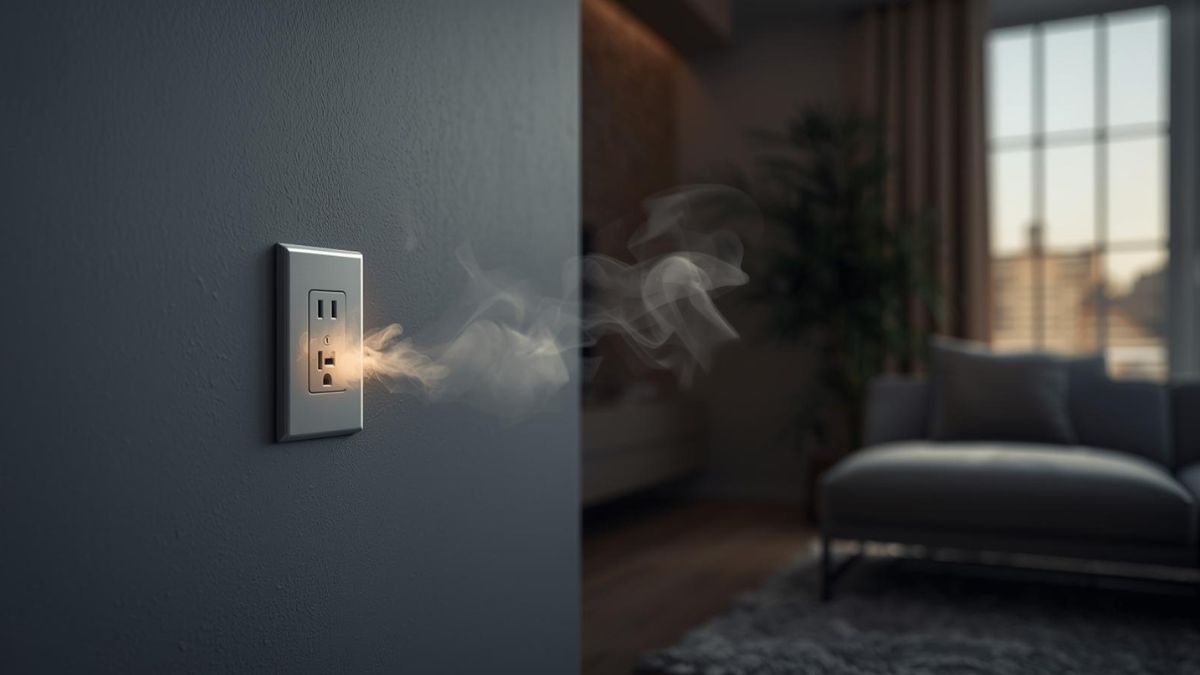Last Updated on September 24, 2025 by Kravelv Spiegel
When an outlet smells like fish, most homeowners don’t realize it’s more than just an odd odor. That strange, unpleasant scent often signals serious electrical trouble lurking inside the walls. Unlike spoiled food or plumbing issues, this smell is caused by overheated wiring and failing outlets, problems that can quickly escalate into dangerous fire hazards. Understanding why it happens and how to respond could be the difference between a safe home and an electrical emergency.
Key takeaways:
- A fishy smell from an outlet usually signals overheating wires, loose connections, or failing electrical components.
- Ignoring the odor is dangerous because it often indicates a potential fire hazard inside the walls.
- Homeowners should immediately stop using the outlet, unplug devices, and call a licensed electrician.
- Preventing future issues requires electrical inspections, updated outlets, circuit upgrades, and safe usage habits.
What Causes a Fishy Smell From an Outlet?
Unlike burning smells that resemble smoke or melting plastic, a fish-like odor often points to overheating electrical components. When certain types of heat-resistant chemicals inside electrical wiring, circuit breakers, or outlets break down, they can give off a fishy smell.
Here are the most common causes:
1. Overheating Wires
If the wiring behind your outlet isn’t properly installed or is damaged, it can overheat. The insulation around electrical wires contains compounds that release fish-like odors when they get too hot.
2. Loose Electrical Connections
Loose connections inside the outlet create resistance, which generates heat. Over time, the outlet may start to char or melt, releasing odors.
3. Overloaded Circuits
If you plug too many appliances into one outlet or circuit, the wires can heat up beyond their safe capacity. This overheating can lead to unusual odors, including that fishy smell.
4. Faulty or Aging Outlets
Outlets don’t last forever. As they wear out, the internal contacts loosen, increasing the risk of overheating. Older outlets are especially prone to causing smells and other hazards.
5. Damaged Wiring Inside the Walls
If the odor seems to come from the outlet but persists even when it’s not in use, the problem might be deeper inside the wall. Damaged wires behind the outlet can heat up and produce odors before showing visible signs of failure.
Why a Fishy Smell Is a Red Flag
Many homeowners assume electrical problems will always smell like something burning. But the truth is, a fish-like smell is just as serious—sometimes more so.
Here’s why you shouldn’t ignore it:
- Fire Hazard: Overheating wires or outlets can ignite surrounding materials. According to the National Fire Protection Association (NFPA), electrical issues are one of the leading causes of home fires.
- Hidden Damage: The smell might be your only early warning. By the time outlets are visibly scorched or sparking, the damage is extensive.
- Health Risks: Constant exposure to heated electrical materials can release toxic fumes into your home’s air.
If you smell fish from an outlet, treat it as an urgent issue.
What To Do If Your Outlet Smells Like Fish
1. Unplug Appliances
Immediately unplug anything connected to the outlet. This reduces the load on the circuit and may prevent further overheating.
2. Do Not Use the Outlet
Stop using the outlet until it has been inspected. Cover it with tape or a note so no one else accidentally plugs something in.
3. Check for Other Symptoms
Look for additional warning signs:
- Warm or hot outlet covers
- Flickering lights
- Tripped breakers
- Discolored or melted plastic around the outlet
4. Call a Licensed Electrician
This is not a DIY fix. Electrical issues behind a fishy odor often require replacing wiring, outlets, or breakers. A professional will safely diagnose and repair the problem.
5. Turn Off Power If Needed
If the smell is strong or persistent, shut off the circuit at the breaker box until the electrician arrives. This lowers the risk of fire.
How to Prevent Electrical Odors in the Future
Once the issue is fixed, you’ll want to avoid repeat problems. Here are some preventative steps:
Schedule Regular Electrical Inspections
Homes older than 25 years are more prone to wiring issues. A licensed electrician can identify outdated wiring, overloaded circuits, or damaged outlets before they become dangerous.
Replace Old Outlets
If your outlets are two-pronged or show visible wear, replace them with new, grounded outlets. Consider tamper-resistant outlets if you have children.
Avoid Overloading Circuits
Don’t plug too many high-wattage appliances (like heaters, microwaves, or hair dryers) into a single outlet. Spread them across different circuits when possible.
Upgrade Your Electrical Panel
If your home still uses an old fuse box or an undersized breaker panel, upgrading can prevent overheating and odors. Modern panels handle today’s appliance-heavy households much better.
Use Quality Surge Protectors
Plug electronics into surge protectors instead of directly into outlets. This helps manage voltage spikes and reduces stress on outlets.
Fishy Outlet Smells FAQs
Yes. Any unusual odor from electrical outlets should be treated as a sign of overheating and possible fire risk.
Yes. Sometimes plumbing issues, spoiled food, or even dead rodents in the wall can cause odd smells. But if the odor is strongest at the outlet and intensifies when it’s in use, it’s likely electrical.
No. Covering up the smell doesn’t solve the underlying hazard. You need an electrician to fix the problem at the source.
Immediately. Even if the outlet is still functioning, continued use could lead to a fire.
Final words
If your outlet smells like fish, it’s not a coincidence and it’s never harmless. The odor points to electrical components overheating, wiring breaking down, or circuits being pushed past their limits—all of which are red flags for fire risk. Acting fast by unplugging appliances, shutting off the breaker if necessary, and calling a licensed electrician protects your home and family. Staying alert to these warning signs and maintaining your electrical system ensures safety, peace of mind, and a future free of unexpected hazards.

